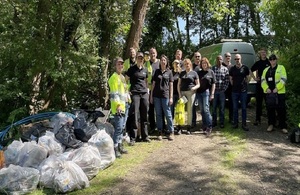Pick up your butts! Cigarettes top plastic litter in rivers
Volunteers cleared rubbish on England's waterways for Plasticblitz. Cigarette butts most common plastic item found in 2 weeks of litter-picking.

Litter-pickers from the Environment Agency show off some of the 700 bags-worth of rubbish hauled out of rivers during Plasticblitz fortnight.
Bringing together volunteers from all walks of life, the annual Plasticblitz has people clearing rubbish from rivers and riverbanks, recording what they find and recycling it where they can.
Organised by environmental charity Thames21, the Plasticblitz sees community groups, environmental charities, rotary clubs and Environment Agency staff taking part in a mass litter-pick and citizen science event on England’s waterways.
Over two weeks this summer:
- 585 volunteers cleared around 58km of river.
- 699 bags of rubbish were collected.
- 71 per cent of recorded waste was plastic.
- Cigarette ends were the most numerous plastic items, followed by drinks lids and food wrappers.
Cigarette butts are believed to be the no.1 most-littered single-use plastic item in the world. The vast majority of cigarette filters contain plastic fibres.
Maria Herlihy, a waterways manager at the Environment Agency, said:
Plasticblitz is a great initiative and we were happy to take part again this year.
Although the figures for plastic pollution are shocking, it’s always great to see how much difference determined volunteers can make to our rivers.
And everyone has a part to play – by reducing their plastic waste, and disposing of it responsibly. Please – pick up your butts!
This is the first year that the Plasticblitz expanded beyond the Thames basin.
Chris Coode, chief executive of Thames21, said:
Since 2021, Thames21 has worked with Environment Agency teams, communities and river action groups to remove plastic waste from the River Thames and its tributaries.
Now all UK rivers can be included in this annual citizen science event, and we hope to see even more people participating next year.
Water quality and the health of rivers must improve. As we keep on reiterating, plastic litter has no place in our rivers or the natural environment. So it is great that the Plasticblitz has brought community groups together for the third time in the space of two years to raise awareness of the issue and help us gather vital evidence to push for change. Pollution is a widespread problem and we must all act together to combat it.
For the first time, Plasticblitz partners joined forces with a new charity, ReAP UK, which specialises in recycling aquatic plastic.
Tony Booker, of ReAP UK, said:
We offer a route to recycling for plastics collected by volunteer groups litter-picking in their local areas. Once processed, even dirty plastics – yes, cigarette butts – can be turned into useful items like benches, birdboxes, even otter holts – and returned to the areas the plastic was found.
We’re excited to be working with the Plasticblitz and look forward to working with the partners again in the future.
Find out more about the 2023 Plasticblitz at https://storymaps.arcgis.com/stories/fd09faa432324f058a9e4b38f5439593 – and keep an eye on the Thames21 website for information about signing up for next year’s! www.thames21.org.uk
- Thames21 joined forces with the Environment Agency and Rotary International to call on volunteering, community and environmental groups to take part in a mass clean-up of plastic waste from rivers across the UK between Saturday 27 May and Sunday 11 June 2023.
- Participating groups were asked to collect data, where possible, on what types of litter they encountered, allowing the Plasticblitz partners to gain an idea of what the most problematic items are. This data feeds into the Europe-wide ‘Preventing Plastic Pollution’ Project: preventingplasticpollution.com
- Plastic pollution is a serious and growing problem within our rivers. Plastic waste threatens wildlife through ingestion and entanglement, and slowly breaks down into tiny plastic fragments called microplastics that can work their way into the food chain.
- Once plastic enters our rivers, no-one is responsible for removing it. Many of our rivers are therefore effectively acting as plastic taps, allowing a constant stream of plastic from inland areas to flow into the sea. Some 80 per cent of plastic pollution found in the sea has passed through rivers and streams on its way there.
- During last year’s Plasticblitz, which covered the Thames river basin, 461 volunteers collected 437 binbags-full of rubbish along 45km of river.
- Thames21 is an environmental charity that works with communities to improve the River Thames and its tributaries. Find out more at www.thames21.org.uk
- ReAP UK encourages the collection of plastic waste from rivers, canals, lakes, and oceans, ensuring it is properly recycled and kept out of landfill. Find out more at www.reap-uk.org